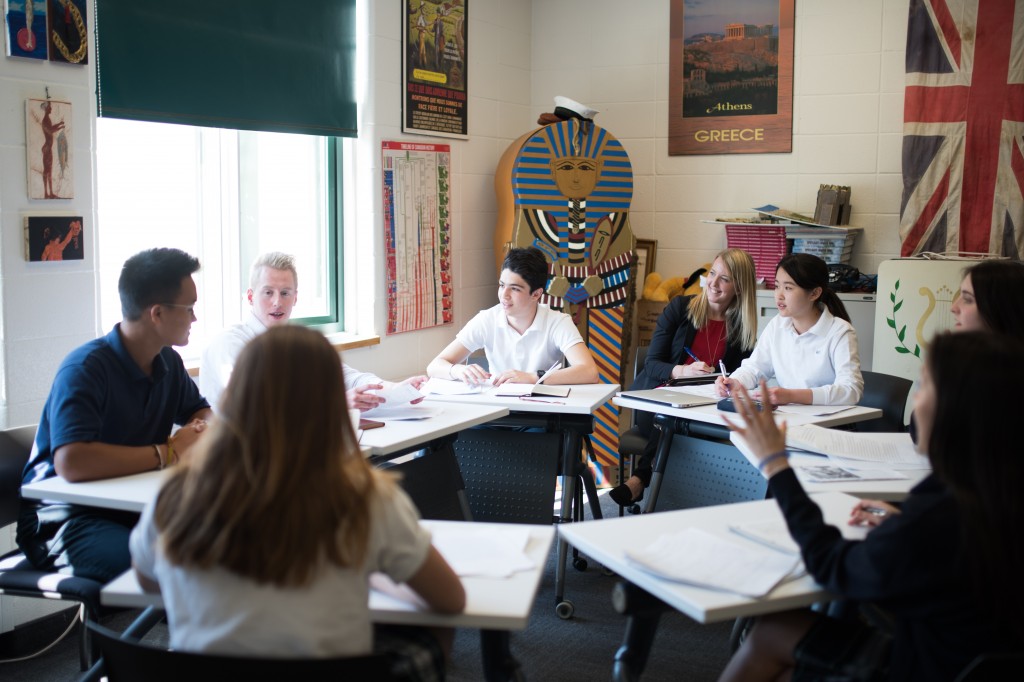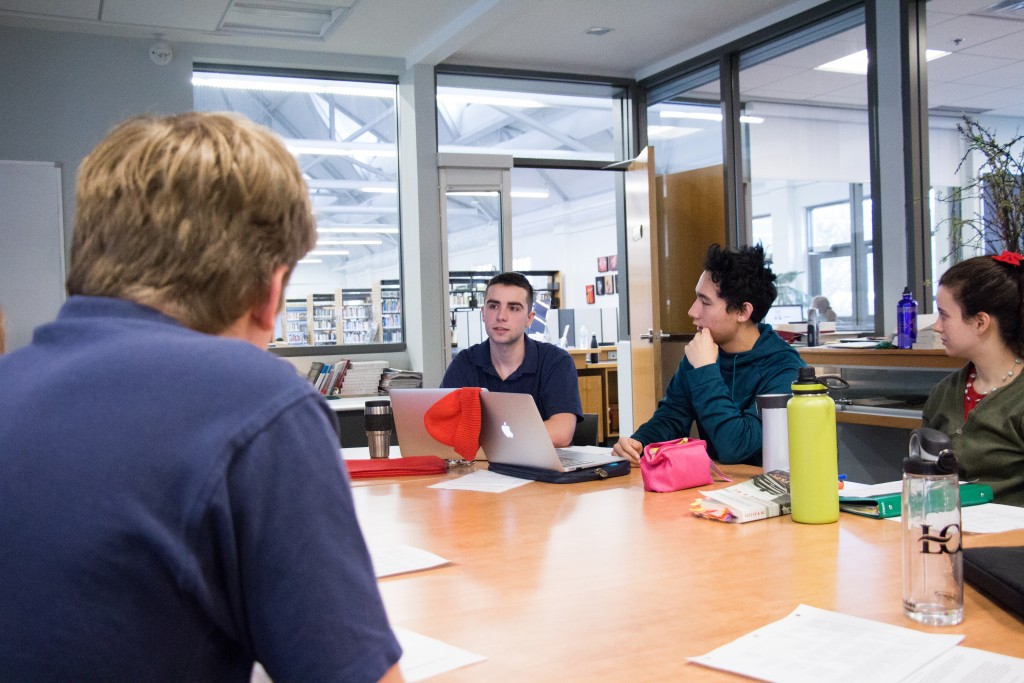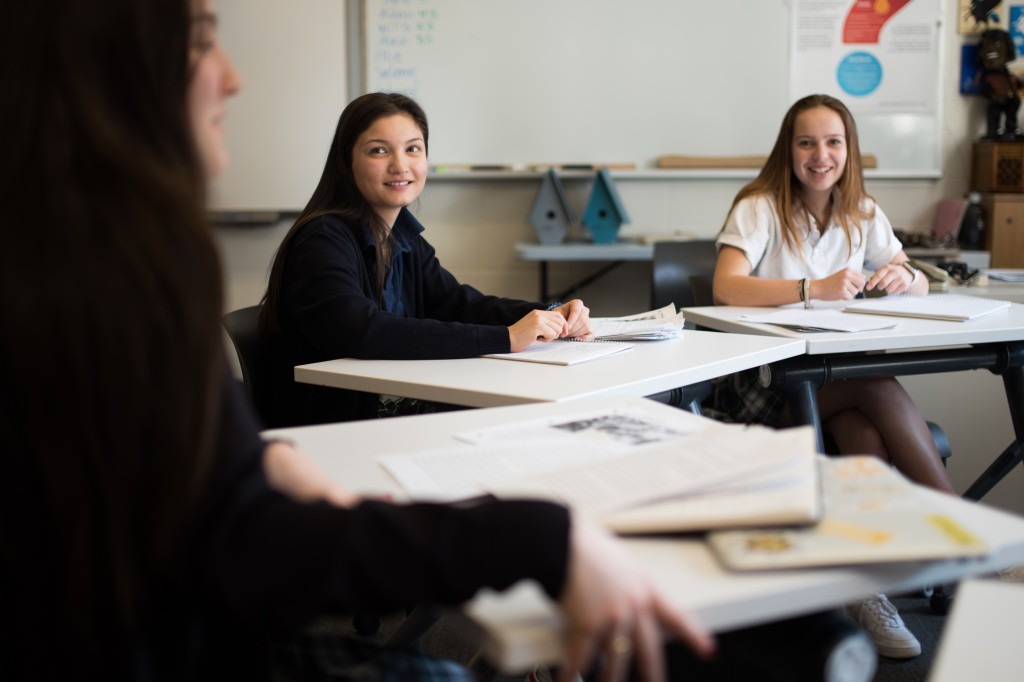
“I discovered I’m not the only one who’s right. By really listening to the others in the discussion, I learned to be open to different ideas—and to build on them. The goal isn’t to win, like in a debate. It’s to come up with better, stronger ideas by listening and responding to each other.”
Grade 11 student Kylie Lee is speaking about participating in Harkness discussions in her English classes at Lakefield College School. More and more Lakefield is incorporating the Harkness Method into its English courses with an eye to enhancing communication skills. And it’s working.
“It makes you pay more attention than you do when the teacher leads discussions. You have to respond to what others say, so you can’t hide—you don’t have the option of not not putting up your hand,” says another Gr. 11 student, Keely Matsusaki.
Developed by the Phillips Exeter Academy (Exeter) in New Hampshire, the Harkness Method puts students in charge of their own learning. Sitting around an oval table, up to 12 students discuss a particular theme, topic or section of text, and their teacher closely observes—but rarely says a word. Preparation is key, as the students must write a variety of inferential questions (testing comprehension of the text) and applied questions (testing interpretations of important concepts) that will inspire a robust discussion. Each student must also send the teacher answers to their questions before the discussion begins. During Harkness, students consider not only what they say, but how they say it. They’re partly evaluated on how they interact with each other and respond to answers and ideas.
Lorraine Brown teaches Advanced Placement (AP) English at Lakefield and is a strong advocate of student-centred learning, so she was naturally drawn to the Harkness Method. “Not only does it give kids ownership of their learning, it teaches them to listen to each other, to encourage the shyer ones to speak up, to stop themselves from dominating the discussion. When they get to university they’ll be prepared to contribute meaningfully in seminars and tutorials. But they’ll also be more skilled at communicating overall.”

Lakefield students who have participated in Harkness discussions for several years bear this out. Lily Coates ’19 has been doing Harkness in her English classes for three years. “I was really shy in Grade 9 but Harkness discussions have helped me become confident about my own ideas, and to feel okay about expressing them. I’m much better now at speaking up and being clear about the point I’m making than I was in Grade 9.”
When English is a second language for students, Harkness also helps them master it. Kylie Lee ’19, an ESL student from Korea, says, “For someone with ESL, it quickly improves your ability to speak and understand English. It’s hard at first. But soon you’re not just hearing key words, you’re hearing whole sentences—and writing in complete sentences instead of points. It also helped me to understand people from different backgrounds and cultures because I got to hear how they applied the key concepts to their own lives.” Considering LCS students hail from 36 countries around the world, this is a tremendous benefit for those who may already know the language but want to excel at communicating in English.
Tina St. John, an LCS English teacher who uses Harkness for her Grade 9 and 11 students, believes Harkness vastly improves the confidence of both global and Canadian students. “They learn to think for themselves. They become more eloquent. And as they develop more confidence in their ideas and in expressing them, their leadership skills flourish—especially the kind that helps others to flourish.”
At a time in education when screens and smartphones are eroding attention spans and undermining the ability of young people to speak and listen effectively, Harkness may be the ideal antidote. Education, government and business sectors all agree that communication skills are vitally important for the future success of individuals. Harkness develops the critical thinking and skilled writing that’s required to produce important questions and answers about the material at hand. But it also hones the ability to pay attention; listen carefully; respond thoughtfully; speak eloquently; be concise; read emotions; build on ideas; think creatively; think on one’s feet; treat others with respect; work collaboratively—in other words, become an exemplary communicator.
“The preparation makes you work hard at understanding the material you’re going to discuss because you have to come up with questions that are compelling. Before we do the discussion, we get together in small groups in class and share our questions. Then we try to answer as many as we can so we’re as prepared as possible on the discussion day,” a student explains.
 Grade 11 students Keely Matsusaki and Lily Coates
Grade 11 students Keely Matsusaki and Lily Coates
Looking deeply into the themes and concepts of the materials they’re studying is key, so teachers using the Harkness Method spend a great deal of time helping their students recognize the authors’ messages. They also have them apply those ideas to their own life experiences. When students see the relevance to their lives, they become more invested in their learning. “They start to understand why we’re teaching what we do,” says Tina St. John. “They start to appreciate why good literature is so important.”
This summer, English teachers Jim McGowan and Amy McGrath will attend a Harkness Method conference at Exeter, and they’re excited about sharing the insights they learn with their colleagues. Head of School Anne-Marie Kee is equally thrilled, as the Exeter conference will allow McGowan and McGrath to bring best practices to Lakefield and help apply Harkness to other programs. The more often students participate in Harkness discussions, the more adept they become. And their critical thinking, their ability to communicate and their social skills all improve. Kee hopes every LCS student will experience Harkness-style learning in the near future. For students moving forward in this ever-changing, high-tech world, the benefits are indisputable.
